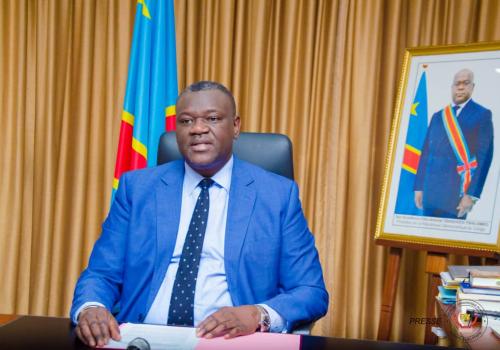The Joint Meeting of the Southern African Development Community (SADC) Committee of Ministers responsible for Transport, ICT, Information and Meteorology and Infrastructure met virtually on 16th June 2023 to discuss strategic policies and activities aimed at accelerating implementation of projects and programmes for regional Transport, ICT, Information and Meteorology Infrastructure.
In his remarks, Honourable Augustin Kibasa Maliba, Minister of Postal Services, Telecommunications, and New Information and Communication Services of the Democratic Republic of the Congo and Chairperson of the Joint Meeting of Committee of Ministers responsible for Transport, ICT, Information, and Meteorology and Infrastructure, emphasised the importance of consolidating their efforts to thoughtfully consider and review policies, strategies, programmes, and projects.
Hon. Maliba urged Ministers to provide active guidance, leadership, and strategic direction to the multiple stakeholders, implementing agencies, and cooperating partners to accelerate the coordination and implementation of regional infrastructure plans as outlined in the Regional Indicative Strategic Development Plan (RISDP) 2020-2030 and the Regional Infrastructure Development Master Plan (RIDMP) and the Short-Term Action Plan (STAP) II for the period 2023-2027.
The Minister urged SADC Member States to address the challenges across all sectorial disciplines emanating from unstable universal socio-economic and political conditions, especially the Russia-Ukraine conflict, declining global economic growth, high rates of inflation, tight monetary and financial conditions, as well as the continued threats posed by the COVID-19 pandemic.
Ambassador Joseph Nourrice, the SADC Deputy Executive Secretary responsible for Corporate Affairs, representing the Executive Secretary of SADC, His Excellency Mr Elias Magosi emphasised that as infrastructure has intertwined linkages with other sectors, such as health, food security, and the environment, SADC Member States must be proactive in ensuring that these sectors develop in a complementary approach.
Ambassador Nourrice called for the development of climate-resilient infrastructure projects and urged Member States to develop innovative solutions and implement best practises that demonstrate resilience to combat adversaries.
Ministers committed to improve the implementation of all actions designed to deepen and promote business and investment in the SADC region by accelerating infrastructure projects and programmes for the Transport, ICT, Information, Energy, Water and Meteorology sectors.
The Ministers further,
considered strategic regional documents designed to improve the implementation of various SADC Protocols in support of regional infrastructure development, which includes regional transport network, power grid and communications systems, energy, water, and sanitation as well as meteorology systems by adopting and approving the Regional Infrastructure Development Masterplan (RIDMP) Short Term Action Plan II (STAP II).
considered the status of implementation of regional infrastructure programmes that support the regional industrialisation agenda as well as the progress made towards achieving planned actions and milestones in support of the SADC Industrialisation Strategy and Roadmap 2015-2063.
endorsed the draft SADC Digital Transformation Strategy (DTS) which aims to digitally empower citizen’s businesses and institutions, thereby maximising the economic, social, and political impact of the use of digital technologies to fulfil SADC’s regional development agenda.
approved the SADC Postal Strategy 2022-2025, which serves as a guide for defining postal priorities and national postal policies and strategies and contributes to the RISDP 2020-2030 and Digital SADC 2027 objectives in which all citizens should have affordable access to information and communications technologies.
reviewed the implementation of the Regional Meteorology Strategy and Action Plan in line with Continental and Global strategies; and considered how National Meteorological and Hydrological Services in Member States are domesticating the regional strategy on meteorology. In this regard, Ministers expressed full support of the SADC Climate Service Centre’s efforts to reach the demonstration phase of the World Meteorological Organisation accredited Regional Climate Centre.
noted that the SADC Aviation Safety Organization Charter became effective on the 1st April 2023 following ratification by the required number of Member States. The Charter will guide in achieving the aspirations of the Global Aviation Community as enshrined in the Global Aviation Safety Plan contributing towards an enabling environment to facilitate movement of goods, services, capital, and human capacity within the SADC region.
congratulated Angola, DRC, and Zambia for signing the legal instruments establishing the corridor management institutions for the Lobito Development Corridor which will provide an effective and efficient route that facilitates the transportation of goods within territories between the three Corridor Member States, through harmonisation of policies, laws, and regulations; coordinated joint corridor infrastructure development strategies and activities.
applauded the successful implementation of the Tripartite Transport and Transit Facilitation Programme (TTTFP), urged Member States to continue implementing and domesticating the agreements made under the TTTFP, and directed the SADC Secretariat to collaborate with the Common Market for Eastern and Southern Africa (COMESA), East African Community (EAC) and the African Union Commission (AUC) in mobilising resources and designing successor programmes at corridor, Regional Economic Communities, Tripartite and Continental levels.
The Joint Meeting of Committee of Ministers responsible for Transport, ICT, Information and Meteorology and Infrastructure was attended by Ministers and representatives from Angola, Botswana, Democratic Republic of Congo, Eswatini, Lesotho, Madagascar, Malawi, Mauritius, Mozambique, Namibia, South Africa, United Republic of Tanzania, Zambia, and Zimbabwe.
The meeting was also attended by representatives from International Cooperating Partners, United Nations Agencies, Implementing Agencies and Development Partners responsible for these sectors.

